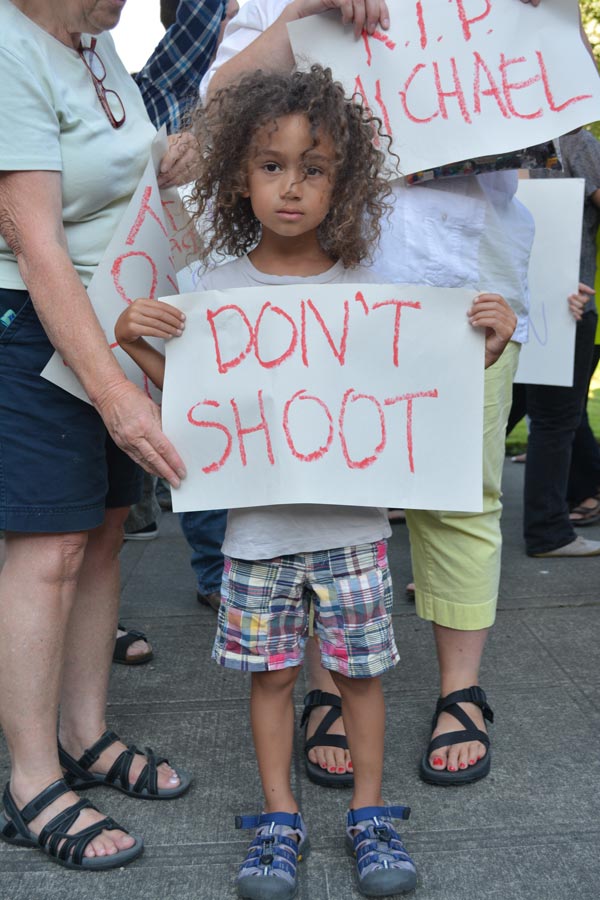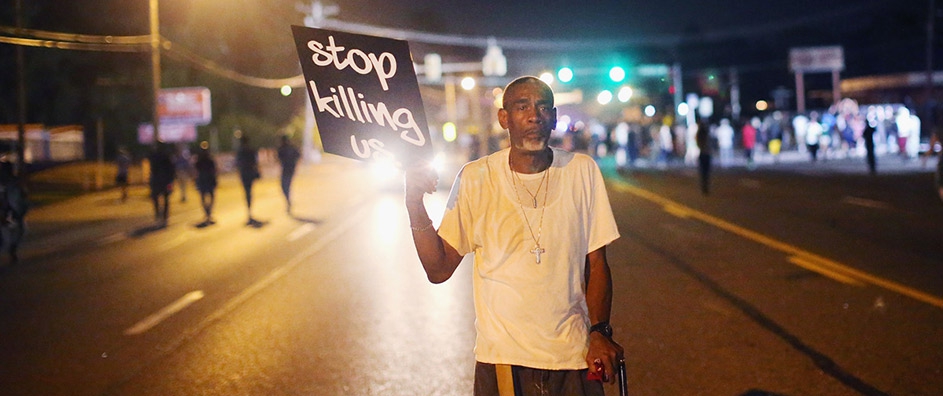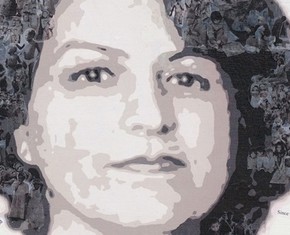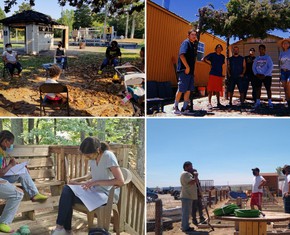The views expressed in our content reflect individual perspectives and do not represent the authoritative views of the Baha'i Faith.
“I went down to the courtroom looking for justice, and that’s what I found—just us.” – Richard Pryor.
In Ferguson, Missouri, the grand jury’s decision not to indict the police officer who shot Michael Brown sparked a predictably violent reaction. Rage poured out of people. Buildings burned, weapons blazed, tempers boiled over. The news media covered this most recent volcano of violence, like they often do, without much meaningful reflection on the long-simmering lava underneath it.
So let’s step back from the spectacle for a minute and consider those root causes.
 The American justice system, starting at the very origin of America itself, has traditionally viewed people of color as second- and third-class citizens. The Constitution famously declared people of African origin as three-fifths of a person. After the Civil War, the American South had disproportionate representation in Congress because of its large black ex-slave populations, but those populations were systematically refused the right to vote—giving the lion’s share of the nation’s legislative power to Southern segregationist politicians. Even today, long after the eras of slavery and Jim Crow have officially passed, we still see systematic efforts to disenfranchise and deny the vote to minorities.
The American justice system, starting at the very origin of America itself, has traditionally viewed people of color as second- and third-class citizens. The Constitution famously declared people of African origin as three-fifths of a person. After the Civil War, the American South had disproportionate representation in Congress because of its large black ex-slave populations, but those populations were systematically refused the right to vote—giving the lion’s share of the nation’s legislative power to Southern segregationist politicians. Even today, long after the eras of slavery and Jim Crow have officially passed, we still see systematic efforts to disenfranchise and deny the vote to minorities.
This endemic race-based injustice—which stems from the underlying idea that a black or brown life is somehow worth less than a white one—pervades the American justice system to this day.
If you don’t believe it, just take a look at the numbers.
Almost every study shows that whites and people of color commit crimes at approximately the same rates, but America’s prison populations don’t reflect that fact. People of color, who make up approximately 30% of America, represent 60% of America’s prison population. American prisons and jails currently incarcerate one in every 15 African American men and one in every 36 Hispanic men–in comparison to one in every 106 white men. Multiple research projects, many conducted by the United States government itself, show that people of color are disproportionately policed, arrested, jailed, imprisoned and sentenced to death. They are three times more likely to be searched when stopped by police. They often face the threat of police violence, as well—African Americans are almost four times as likely as whites to experience the use of force during encounters with the police.
In fact, the FBI reports that during the years 2010-2012, young black men were 21 times as likely as their white peers to be killed by police.
Those stark realities, along with the ongoing mass incarceration of people of color across the country, have spread an enormous awareness of injustice and bias throughout the African American and Hispanic communities. People in those communities have the very strong sense, backed up by what they see every day, that despite the progress made in civil rights, equal justice continues to elude them.
Without attempting to weigh in on this grand jury’s specific no-indictment decision in Missouri, let’s contemplate what might need to happen in America to begin bringing about a change in the endemic racial bias that plagues our justice system and our entire society.
First, from a Baha’i perspective, the justice system has to rid itself of all racial prejudice, or risk tearing apart our entire culture:
We must banish prejudice. …racial prejudices must disappear, for they are the destroyers of human society. We must become the cause of the unity of the human race. – Abdu’l-Baha, Divine Philosophy, p. 25.
Second, every governmental body needs to focus its attention, its budgetary power and its reformative intent on rooting out every trace of racial disparity from its midst:
Racial prejudice or separation… is unnatural and proceeds from human motive and ignorance. – Abdu’l-Baha, The Promulgation of Universal Peace, p. 287.
Third, because our justice systems are only as good, as unbiased and as fair as we are, our entire society itself has to confront the problem of racial injustice. People of color can’t be the only ones who act to breach and break down the racial divide—we all need to own the issue:
According to the teachings of Baha’u’llah all religious, racial, patriotic and political prejudice must be abandoned, for these are the destroyers of the real foundation of humanity… All prejudices are against the will and plan of God. Consider, for instance, racial distinction and enmity. All humanity are the children of God; they belong to the same family, to the same original race. There can be no multiplicity of races, since all are the descendants of Adam. This signifies that racial assumption and distinction are nothing but superstition… All these in the presence of God are equal; they are of one race and creation; God did not make these divisions. These distinctions have had their origin in man himself. Therefore, as they are against the plan and purpose of reality, they are false and imaginary. – Abdu’l-Baha, The Promulgation of Universal Peace, p. 299.
Finally, we need a unified vision of the future to work toward:
The unity of the human race, as envisaged by Baha’u’llah, implies the establishment of a world commonwealth in which all nations, races, creeds and classes are closely and permanently united, and in which the autonomy of its state members and personal freedom and initiative of the individuals that compose them are definitely and completely safeguarded… National rivalries, hatreds and intrigues will cease, and racial animosity and prejudice will be replaced by racial amity, understanding and co-operation. The causes of religious strife will be permanently removed, economic barriers and restrictions will be completely abolished, and the inordinate distinction between classes will be obliterated. Destitution on the one hand, and gross accumulation of ownership on the other, will disappear. – Shoghi Effendi, The World Order of Baha’u’llah, p. 203.
You May Also Like
Comments

















Again utilizing the superlative Abdu’l-Baha said:
“Therefore the very first service to the world of man is to establish this auxiliary international means of communication. It will become the cause of the tranquillity of the human commonwealth. Through it sciences and arts will be spread among the nations and it will prove to be the means of the progress and development of all races. We must endeavour with all our powers to establish this international auxiliary language throughout the world.”
Here, addressing the Esperantists of Washington D.C. ...25th April 1912 Abdu’l-Baha in yet another extract links the principle of banishing racism (in this case: “the means of the progress and development of ALL races”) with that of a universal auxiliary language.
Quite a few Baha'i opine to me privately that Abdu'l-Baha's 'musts' vis-a-vis Esperanto for all Baha'is were relative to an era prior to WW2 but no longer. What really tests our friendship is a rejoinder inquiring as to whether other 'musts' voiced by the Master are no longer valid or just his "'repeated and emphatic admonitions" regarding Esperanto, to quote the Guardian's interpretation of the Master's 'musts' surrounding Dr Zamenhof's language of world peace.
When society at large rejects offer after offer to independently investigate the truth of Baha’u’llah’s healing message and when notables in academe, whether in civil society or in our own ranks, refuse to consult on a fundamental Baha’i principle the Master advises us to leave them to themselves and to pray for the progress of their souls; this second part of His advice is the clincher
i m o.
Baha'i love
Paul
How is this to be done in vastly accelerated numbers in comparison with the de facto situation in the Baha'i Faith since before the publishing of the Promise of World Peace in 1985? For more than 30 years we've been stuck at about six million ...members repeatedly banging on about the same solutions cited in that mighty Promise with the exception of demonstrably the most important solution therein if we take the use of the superlative at face value as penned by the Universal House of Justice:
"A fundamental lack of communication between peoples seriously undermines efforts towards world peace. Adopting an international auxiliary language would go far to resolving this problem and necessitates the most urgent attention."
Heaps and heaps of Baha'i extracts more directly link the language principle with the cure for racialism but here below is my all time favorite:
"His Holiness BAHÁ’U’LLÁH fifty years ago wrote a book; that book is called ‘The Most Holy Book’ (Kitáb-i-Aqdas), and in that book one of the fundamental principles of the Bahá'í movement is that there must be the invention of an auxiliary language; and then He goes on to explain the benefits and profits that will accrue through such a medium. Now, let us thank the Lord because this Esperanto language has been created. Therefore we have commanded all the Bahá'ís in the Orient to study this language very carefully, and ere long it will spread all over the East. Therefore I request you also,non-Esperantists and fellow-Esperantists, to put your utmost exertion into the spread and promulgation of this language, because it will hasten that day, that millennial day, which has been prophesied by the past prophets and seers, that day in which, it is said, the wolf and the lamb will drink from the same fount, the lion and the deer graze in the same meadow. The signification of this Holy Writ is that the contesting races, warring nations, inimical religions, will come to each other in the spirit of love and amity -- then, the day-spring of that millennium; and every means, every instrument which confers unity and amity upon the children of men, that is love and that is the spirit."
Abdu'l-Baha quoted in Star of the West, vol.11 no.18, (outer vol. 6) pp. 299-306. 7 February 1921.
Does it not make sense that for middle and high class anglos to come together in amity with people of color who have been for centuries pushed into lower classes and into under privileged education that we all need a neutral, non-colonial simple but not simplistic lingo as a second language in which we all start from scratch. It befits humanity not to retard debate on the issue while the shunning of consultation on a fundamental Baha'i principle (a universal auxiliary language) is a breach of the Covenant as far as Baha'is are concerned, Our supreme institution is perfect but we are not. In fact, Baha'u'llah has named consultation itself a fundamental principle of the Faith. 'What we have here is a failure to communicate' as America's coolest actor once observed long ago.
Baha'i love
Paul